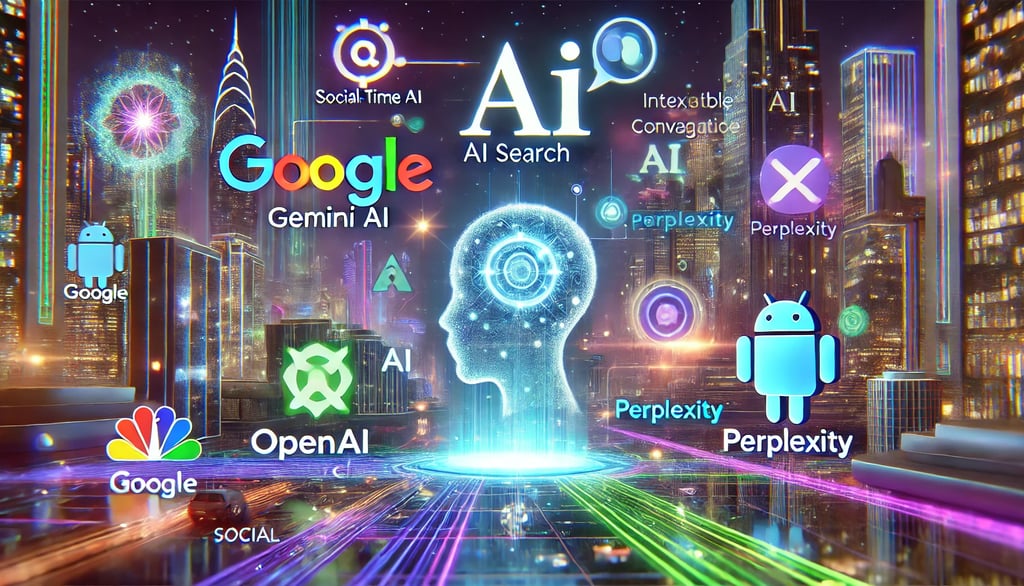Talk to us to build your ai squad team
The Battle for the Future of Search: Google, OpenAI, and Perplexity Race for AI Search Dominance
Geek Master
12/3/20243 min read


AI is transforming nearly every corner of our lives, and one of the hottest battlegrounds right now is the search engine industry. But this isn’t just about Google vs. Bing anymore; it’s about AI-powered search engines that are evolving faster than ever before. Google, OpenAI, and Perplexity are all making their moves to define the future of how we find information online—and it could drastically change how we interact with the web. But what does this really mean for everyday users, businesses, and the future of AI automation? Let’s break it down.
Google’s Gemini AI: The Giant’s Bold Move
For years, Google has been the undisputed leader in search. But now, with AI technology rapidly advancing, Google is stepping up its game with its Gemini AI platform, which is bringing AI-powered search to a whole new level. The new "Grounding with Google Search" feature allows Gemini AI to tap into real-time search data, providing live, citation-backed information that developers can integrate into their applications.
This is huge for developers. For just $35 per 1,000 queries, they can now leverage Google’s vast search expertise to offer real-time, verified answers within their applications—something that was once reserved only for search engines. The race for real-time data, combined with the power of AI, will mean faster and more reliable results, benefiting both developers and users alike.
For consumers, it means better, more up-to-date search results. Whether you’re looking for news, stock prices, or answers to high-value queries, you’re likely to see even more accuracy and relevance in your search results, thanks to AI and live data.
OpenAI’s ChatGPT Search: AI Meets Conversation
Enter OpenAI, the powerhouse behind the popular ChatGPT. OpenAI has rolled out its ChatGPT Search, designed for those who prefer a more conversational, easy-to-understand approach to finding information. This search engine taps into real-time partnerships with news sources like The Associated Press and Vox Media, providing consumers with verified, source-backed answers across topics like current events and stocks.
What sets ChatGPT Search apart is its ability to respond conversationally, just like you’re talking to a knowledgeable friend. The integration of GPT-4 takes this to the next level, offering deeper, more nuanced answers.
ChatGPT Search is bringing AI closer to consumers by making access to trustworthy information quicker and easier. This is great for people who want to access premium content and verified news quickly, without the need to wade through multiple articles or sources.
Perplexity: The Search Engine That Lets You Choose Your AI
Then there’s Perplexity, a newcomer to the search scene that’s bringing a fresh approach. Unlike traditional search engines, Perplexity gives users the option to choose between Claude, ChatGPT, and Sonar—three powerful AI models. This flexibility allows users to customize their search experience, tailoring responses to their specific needs, whether they’re looking for structured, detailed answers or more general information.
For anyone seeking depth in their search results, Perplexity gives you the power to pick the AI model that fits your needs. This personalized approach could drastically change how we engage with AI, offering greater accuracy and customization in our search experiences.
AI Automation: The Future of Real-Time Data
One thing that stands out across all these platforms is the rise of AI-driven automation. With tools like Gemini AI, ChatGPT Search, and Perplexity, AI can now browse the web in real-time to gather the latest, most relevant information. This opens the door for businesses to leverage real-time, data-driven insights, giving them the ability to adapt quickly to changes in the market.
For fast-paced industries like e-commerce, this is a game-changer. AI automation allows businesses to stay updated on shifting trends and provide timely, relevant content to customers. Imagine being able to react to changing consumer behavior or breaking news within minutes—AI search could be the key to staying ahead of the competition.
In the near future, the way we search for information will no longer be limited to traditional search engines. Instead, we’ll have access to real-time, AI-powered results that can give us the most relevant and up-to-date answers—whether we’re looking for personalized insights, news, or business intelligence.
As AI search engines like Google’s Gemini, OpenAI’s ChatGPT, and Perplexity continue to evolve, we’re looking at a future where AI automation isn’t just a convenience—it’s a necessity. From improving user experiences to revolutionizing business strategies, these AI-driven search engines are shaping the future of how we gather information and interact with the web.
Key Takeaway: The AI search wars are more than just a battle for who’s the best search engine—they’re a revolution in how information will be delivered to us, how businesses will adapt to market changes, and how AI can make our online experiences faster, smarter, and more personalized than ever before. Keep an eye on these advancements, because the next era of search is here, and it’s powered by AI.
